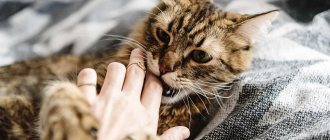An overly hyperactive kitten can be difficult to deal with, especially since the average kitten is already a ball of fluffy energy that is difficult to control and train. But it's also important to remember that it's completely normal for kittens to have a lot of energy and want to run, climb, jump, chase and play. In fact, if your kitty isn't acting this way, consider talking to your veterinarian to make sure your little fur baby is doing well.
If your kitten seems to have endless energy and you want to help him relax a little, there are ways to calm a hyperactive kitten. Most solutions involve simply providing your pet with different ways to release his energy in a positive way. This way she will be ready to rest and recharge. So, before you lose patience with your rambunctious little friend, keep reading for some tips. And if you've tried several different strategies but nothing has worked, and you think your kitten is oversensitive, consult your veterinarian for support and guidance.
What to do if the kitten is very active?
If a kitten is hyperactive, this may indicate thyroid disease, as well as be a temperamental trait or a reaction to environmental events. Excessive activity can be temporary or chronic. Therefore, the owner should know when hyperactivity in a kitten can be eliminated on their own, and in which cases contact a veterinarian.
According to veterinarian statistics, in 5% of cases, thyroid dysfunction is diagnosed in young cats under 8 years of age; in rare cases, the disease is congenital and affects kittens.
Reasons: why is the baby too active?
Non-pathological factors
Kittens are characterized by playfulness and mobility, which alternates with prolonged sleep. However, there are reasons that increase the baby’s activity. These factors include:
While the fluffy is still small, mobility should be inherent in it.
- Change of scenery. If the baby is taken away from its mother and brought to a new room, the kitten is bombarded with new smells and sounds that the little cat is not yet accustomed to. He rushes around the room, meows, experiences stress, and his nose even gets dry. Moving overstimulates the nervous system, so the kitten may run and jump a lot for several days.
- Young age. A playful kitten is the normal state of a baby. As the cat gets older, it will become reserved.
- Excessive severity of the owner. If the baby is often shouted at and punished, the small cat’s active actions are a kind of protest and response to the owner’s behavior.
- Frequently being left alone. If the baby does not have toys, in the absence of the owner, the kitten itself finds fun from furnishings, throwing off and rolling everything it finds on the floor.
Return to contents
Features of temperament
There are choleric cats among cats. These are the most active and mobile representatives of all types of character. Such a pet grows up too playful and active, and shows emotions violently. During outdoor games, the kitten sometimes becomes aggressive, biting and scratching. Choleric cats are emotional, often using their teeth and claws if something does not suit them. They sleep little and love to be the center of attention. Also, a change in mood quickly occurs and the pet becomes very affectionate.
Activity as a symptom of disease
Lack of microelements
If a small cat is too active, this may be a manifestation of an unbalanced diet, when it does not receive all the necessary nutrients, and behavioral deviations develop. Most often, hyperactivity is provoked by a lack of thiamine (vitamin B1), which has a positive effect on the nervous system and is responsible for adequate behavior and a healthy psyche. The baby also becomes hyperactive due to a lack of taurine, which is manifested by excessive nervous excitability, aggression, inexplicable anger, superficial and anxious sleep.
Hyperthyroidism
It is characterized by excessive production of thyroid hormones - triiodothyronine and thyroxine. Most often, older cats suffer from the disease, but in rare cases the disease is congenital. Immediately after birth, the disease does not manifest itself in any way. One of the symptoms of the pathology is dwarfism. Associated symptoms:
With this disease, the furry may require food more often than expected.
- increased appetite;
- excessive activity;
- weight loss;
- irritability and aggression;
- obsessive meowing, which has not been observed before;
- increased thirst;
- frequent urination;
- dull, matted fur or hair loss;
- vomit;
- intestinal disorder.
Return to contents
Contraindications and side effects of sedatives
Homeopathic remedies have a gentle effect on the cat’s nervous system and have virtually no contraindications, which cannot be said about chemical drugs. They should be used only after consultation with a veterinarian. Among the contraindications:
- age up to one year;
- pregnancy;
- lactation;
- diabetes;
- renal and liver failure;
- low blood pressure;
- diseases of the cardiovascular system;
- hypersensitivity to active substances.
If used uncontrolled, sedatives can cause addiction and a number of side effects:
- drowsiness;
- restlessness and irritability;
- skin redness;
- itching;
- hair loss;
- discharge from the nose and eyes;
- nausea;
- vomiting;
- diarrhea;
- flatulence;
- decreased blood pressure;
- increased heart rate.
How to reduce activity?
To calm a small cat that is more than a month old, you should provide it with a variety of toys. Hanging mice, birds, and balls are suitable, which the baby can catch and run after. Such fun should not have sharp elements, the elastic bands are soft, without feathers that the cat can bite off and swallow. Playful kittens should be provided with a high scratching post with holes for climbing. It is advisable for the owner to play with the cat more often, since a running baby quickly runs out of energy and falls asleep.
How to calm a hyperactive kitten?
An overly hyperactive kitten can be difficult to deal with, especially since the average kitten is already a ball of fluffy energy that is difficult to control and train. But it's also important to remember that it's completely normal for kittens to have a lot of energy and want to run, climb, jump, chase and play. In fact, if your kitty isn't acting this way, consider talking to your veterinarian to make sure your little fur baby is doing well.
If your kitten seems to have endless energy and you want to help him relax a little, there are ways to calm a hyperactive kitten. Most solutions involve simply providing your pet with different ways to release his energy in a positive way. This way she will be ready to rest and recharge. So, before you lose patience with your rambunctious little friend, keep reading for some tips. And if you've tried several different strategies but nothing has worked, and you think your kitten is oversensitive, consult your veterinarian for support and guidance.
How to calm a small and active kitten - basic tips
Having your own pet is a dream that many want to make come true.
A pet that you can take care of will become an excellent friend and ally. When choosing a pet, many people prefer a young cat or dog. If the choice falls on a small kitten, it is desirable that it adapts well and adapts to home conditions.
But most often the kitten turns out to be too active and playful. No need to worry about this
If you pay due attention to discipline and education, an obedient and moderately calm pet will grow out of a hyperactive fidget.
Kitten activity
The behavior of a small representative of the cat family is very similar to the behavior of a small child. He also knows how to rage, play pranks, and disobey. An 8-week-old kitten may be more active than its one-year-old counterpart. But, as experts note, there are cat breeds that are hyperactive on their own and this is the norm for their character.
How to calm a kitten when he's mad
If it’s time to sleep, but you can’t calm down the kitten, here are some simple tips that will help your pet become more disciplined:
Play with him
To release some of the kitten's pent-up energy, an excellent solution would be to include him in play. A suitable option is an imitation fishing rod. By changing its direction and speed, you can create the impression of hunting prey. You can also encourage the kitten by making it run after the ball. But you shouldn’t use yarn for the game. This can lead to intestinal diseases in your pet. It is not the most suitable way to calm a kitten by including your hand and fingers in the game. This will provoke him even more.
Reward him with food
You should not leave food for your ward in the public domain. It will be better if you create conditions similar to those in the wild. For every labor there is a reward in the form of food. There are many devices on sale now that are labyrinths. To get to the food, the kitten will first have to locate it. After a good game and satisfaction of hunger, the kitten will definitely want to sleep.
Create conditions
Currently, pet stores offer a huge selection of cat houses. As you know, cats love high spaces from where they can observe. Additionally, tall spaces provide more room for exploration. If the house is equipped with shelves, a scratching post, and a hidden area, the kitten will happily mark its territory and release energy. An ordinary box can be a replacement for a purchased house, because cats like not only high, but also enclosed spaces.
Discipline him
It happens that a kitten is completely out of control and nothing helps to calm it down. In this case, you need to use suitable parenting methods. Growing kittens, like children, need a mentor and respond to strict and consistent discipline. Don't yell at him or hit him for bad behavior. He may remember this and be offended. If the kitten does not understand a calm tone, you should leave him alone in the room for a few minutes. It also helps to sober up a bully if you splash water on him or lightly flick him on the nose. You should not abuse such methods.
Calming a kitten will not be difficult. As in any business, it pays to put in a little diligence and patience.
Perhaps the kitten is lonely and is trying to attract attention. In this case, you can get him a companion
In the new company, he will feel responsible and become calmer and more flexible.
https://kotikdoma.com/uhod-za-koshkami/sredstva-uhoda-za-koshkami/kak-uspokoit-kota.htmlhttps://pets-expert.ru/kak-uspokoit-kota/https://pristor. ru/kak-uspokoit-malenkogo-i-aktivnogo-kotenka-osnovnye-sovety/
Give your kitten her own sanctuary
If your kitten is acting up, let him relax in his own sanctuary. This could be a dimly lit, small room where he can relax away from other pets, distractions and people. It should also be a space where the kitten can play and release his energy without worrying about destroying anything.
© shutterstock
Like all other rooms in your home where your kitten will spend time, it should be a safe place where he will not be at risk of harm. So take the time to make sure there are no places where your kitten could accidentally get stuck (this may require blocking off part of the room so the kitten can't walk through and get hurt). It's also a good idea to remove valuables or items that could be broken by a cheerful kitten who sees almost anything as a potential toy. And make sure there are no small objects that could be dangerous to your pet or objects that could be accidentally swallowed.
With a safe space filled with cat toys, scratching posts, a cat tree, a litter box, food and water, your kitty will be ready to explore, play and practice becoming the natural predator that she is.
Question and answer: hyperactive cat
Hyperactive cat. What to do?
A month ago we got a kitten. The cat is already 7 months old. At first, the cat adapted and got used to us and the new home. Everything was going well until she began to “go crazy,” especially at night: turning everything upside down, including chairs, jumping up to the ceiling, in general, it became impossible to sleep peacefully now. Tell me what to do about this and how to calm our cat?
Maria
Firstly, our reader’s cat is still practically a kitten. And her desire for active games at this age is quite natural.
Secondly, such nocturnal behavior tells us that this is, after all, a predator with a predominantly nocturnal lifestyle. Of course, a cat that lives at home does not need to hunt at night, and indeed there is no need to hunt at all, but why not jump onto the blanket from above, seeing the movement of our legs under it?
And finally, imagine your own cat’s daily routine. During the day, while we work and study, our cat sleeps. And in the evening, when all the household members return home, from the cat’s point of view, it’s time for games and fun. Therefore, it is not surprising that a cat behaves this way.
Isolating the kitten from the owners' bedroom will not solve the problem of nocturnal hyperactivity.
In such a situation, the following recommendations can be given.
Pay attention to your own cat in the evening and be sure to play with her! Of course, we often come home tired, and all we can do is throw a mouse or a ball a couple of times. But for some reason we got a pet at home, which means we must pay attention to it and understand the needs of the cat. Motor activity is a natural need for a cat, because its ancestors obtained their food by hunting, and accordingly, they were forced to move a lot.
Therefore, in order for your cat to behave calmly at night, you need to accustom it to a certain daily routine: an hour and a half before you go to bed, you need to “run out” the cat, as a result of which, for obvious reasons, it will get tired. Use a laser pointer, your favorite toys, teasers, wigglers, interactive toys for cats, balls, and mice. The main thing is that the cat spends the energy accumulated during the day.
In addition, do not feed your cat immediately upon arriving home in the evening, but just before bed. It has been verified that after a hearty dinner, kittens sleep peacefully for several hours. And, therefore, if you feed a kitten at 18-19 hours, then it is not surprising that by 21-22 hours the cat will again be full of strength and energy.
Such a daily routine, with active games an hour and a half before bedtime and feeding immediately before bedtime, as a rule, quickly solves a problem similar to the problem of our reader. Cats easily adapt to this regime. The main thing in this matter is regularity.
And under no circumstances should you follow the cat’s lead! If a kitten demands attention and participation in its games at night or early in the morning, you should not give in to slack.
So, I’ll illustrate with my own example: the owner of one of my kittens, instead of defining boundaries and showing that the requirements of playing at night are useless, got up every night at 4 o’clock and played for half an hour with the cat. Naturally, the kitten, each time getting what it wanted, behaved in the same way every next night and demanded a new portion of games and attention. After all, cats are excellent manipulators, and, seeing that their actions have the desired result, they will continue to behave accordingly again and again.
Also, one of the ways to solve the reader’s problem is the appearance of a second cat in the house. After the adaptation period, they will be able to play with each other during the day while their owners are not around, rather than sleeping all day long.
Irina Kostyuchenko, felinologist
If you have questions about keeping, feeding cats, as well as suggestions, send them to the editor or to my email address HYPERLINK “mailto: Email address is being protected from spambots.
Javascript must be enabled in your browser to view the address." The email address is protected from spambots.
Javascript must be enabled in your browser to view the address. Answers to the most interesting questions will be published on the pages of the magazine
Play soothing music
Often, kittens may behave hyperactively as a result of uncertainty or fear, which may be caused by being in a new home, sharing that new home with strange new cats and people, or other stimulants in the environment.
Once you've given your kitten a safe place, try playing music at a low volume. Choose soft music, instrumental or classical music, as it will calm your kitty's nerves just as music calms yours.
Signs of gaming aggression
In fact, there is nothing strange about the aggressive behavior of kittens. Cats are typical predators. In nature, they catch up with prey, dig into it with sharp claws and, with a lightning-fast movement, bite off the cervical vertebrae.
Have you noticed how little kittens behave when they have barely learned to walk? They growl and attack each other, biting and scratching their brothers and sisters. The mother cat also gets a lot. However, as soon as one of the kids gets too carried away with the role of the “evil and scary tiger,” he will immediately be put in his place: his mother will give him a couple of slaps on the wrist, and the brothers and sisters will growl threateningly or, even worse, crawl away about their business. The poor guy can only cry and seek comfort from his mother. This is how the kitten learns to control aggression.
If there is an adult cat in the new home where the kitten ends up, the baby will learn this from his older friend. Calmer and more balanced than a cat, the cat will happily play with the baby. He is not annoyed by the way the kitten sneaks up on him, pressing his tummy to the floor, and attacks him from behind. And you can endlessly watch how the baby selflessly catches the quivering tip of a long tail hanging from the back of the chair, like fire and water. However, as soon as the kitten crosses the thin line that separates play from hunting, the cat will immediately slowly walk towards him, tilting his head and slightly snorting with his nose. Reprisals usually do not follow: the little sly man falls to the floor, raising all four paws in the air in a defeatist gesture.
Thanks to strict control, the kitten quickly learns to control itself and grows up calm and very affectionate. There are also cats that stay with their mother for the rest of their lives.
It's another matter when you find yourself alone with a small kitten. You will have to teach him all the wisdom of life on your own, and this is not always easy. You and your family will get bitten and scratched by needle-sharp claws. Sometimes a person doesn’t have the courage to say a stern “no!” when the baby is intently chewing his finger. It looks so funny! And after a couple of years, seeing that the place on his favorite sofa is occupied by the owner, an adult seasoned cat without hesitation will grab his arm or leg with his teeth.
Play properly
Kittens need play time to develop. They absolutely need to be able to release their energy in a fun and positive way, and will use every play session as an opportunity to practice their hunting skills. Plus, play is a great form of exercise, and as your kitten grows and becomes more coordinated, she'll want to practice using her new abilities to climb, jump, chase, and explore. You can give your kitten time to play on his own, but spending time with your pet every day will also help him release more energy and avoid boredom and loneliness.
Having multiple play sessions with your hyperactive kitten throughout the day is a great way to bond with him while helping him release excess energy. The games you play should simulate hunting, so use toys such as sticks with feathers on the end or stuffed mice that will attract your kitten's attention and inspire his natural predatory skills. Challenge your kitten during play, but also let her win so she experiences the thrill of destroying her prey, even if it's only in her imagination.
Useful tips
Your kitten needs discipline and guidance, just like all small children. When he does something wrong, like attacking your leg, biting or scratching you, just discipline him. This may seem difficult, especially if you have a sharp claw or tooth embedded in your leg, but grit your teeth and remember to exercise self-control. Growing kittens respond best to calm and consistent discipline. Immediately after he does something, say “no” and calmly take him to a room where he will be on his own for 5 to 10 minutes. Do this immediately, or he will simply become confused and not understand anything.
Let your kitten roam safely in nature
If you think your kitten is hyperactive because he has a lot of energy and is tired of being indoors, letting him explore nature in your own backyard for a while may be just what he needs.
Whether you're building or buying an outdoor enclosure or purchasing a large outdoor cat enclosure, you can sit outside with your kitty while she enjoys the fresh air and sun, watches birds and insects, and finds new and exciting ways to release her energy.
Try puzzle toys
Puzzle toys are a great way for kittens to get exercise, but they will also get a mental workout. With these toys, you can strategically hide treats so your pet will have to work a little to figure out how to get to them. Additionally, this type of toy can attract the attention of your hyperactive kitty, and once he smells the treats inside, he will need to use his energy to solve the mystery and get to those tasty treats.
There are many different puzzle toys to choose from, so you can find several that are sure to keep your energetic fur baby entertained while he "hunts" for his "prey." And after she's done hunting for treats, your kitten might even be ready to take a nap.











